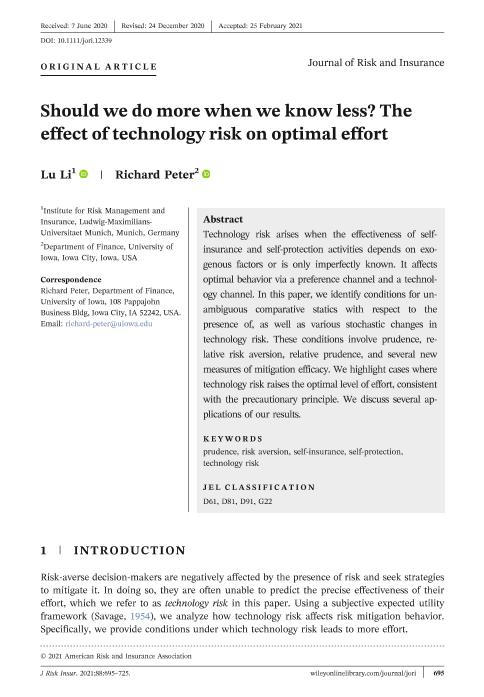Should we do more when we know less? The effect of technology risk on optimal effort

Contenido multimedia no disponible por derechos de autor o por acceso restringido. Contacte con la institución para más información.
| Tag | 1 | 2 | Valor |
|---|---|---|---|
| LDR | 00000cab a2200000 4500 | ||
| 001 | MAP20210028014 | ||
| 003 | MAP | ||
| 005 | 20210929171149.0 | ||
| 008 | 210928e2021 esp|||p |0|||b|spa d | ||
| 040 | $aMAP$bspa$dMAP | ||
| 084 | $a922.13 | ||
| 100 | $0MAPA20210032820$aLi, Lu | ||
| 245 | 1 | 0 | $aShould we do more when we know less? The effect of technology risk on optimal effort$cLu Li, Richard Peter |
| 520 | $aTechnology risk arises when the effectiveness of self-insurance and self-protection activities depends on exogenous factors or is only imperfectly known. It affects optimal behavior via a preference channel and a technology channel. In this paper, we identify conditions for unambiguous comparative statics with respect to the presence of, as well as various stochastic changes in technology risk. These conditions involve prudence, relative risk aversion, relative prudence, and several new measures of mitigation efficacy. We highlight cases where technology risk raises the optimal level of effort, consistent with the precautionary principle. We discuss several applications of our results. | ||
| 650 | 4 | $0MAPA20080587628$aRiesgo tecnológico | |
| 650 | 4 | $0MAPA20080557515$aCibernética | |
| 650 | 4 | $0MAPA20160007633$aCiberriesgos | |
| 650 | 4 | $0MAPA20080553326$aAutoseguro | |
| 773 | 0 | $wMAP20077000727$tThe Journal of risk and insurance$dNueva York : The American Risk and Insurance Association, 1964-$x0022-4367$g01/09/2021 Volumen 88 Número 3 - septiembre 2021 , p. 695-725 | |
| 856 | $yMÁS INFORMACIÓN$umailto:centrodocumentacion@fundacionmapfre.org?subject=Consulta%20de%20una%20publicaci%C3%B3n%20&body=Necesito%20m%C3%A1s%20informaci%C3%B3n%20sobre%20este%20documento%3A%0A%0A%5Banote%20el%20titulo%20completo%20del%20documento%20del%20que%20desea%20informaci%C3%B3n%5D%0A%0AGracias |

